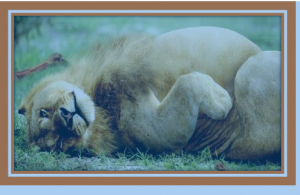News
Latest Lion Aid News
Does the use of lion derivatives in African Traditional Medicine further endanger the species?
Wednesday 2nd October 2013

Fat enough to help you exorcise evil spirits? The use of a variety of animal products in Chinese Traditional Medicine is well known. Less appreciated by those concerned with the current rate of poaching of Africa’s wildlife is the fact that a diversity of animal products has also long been used in African Traditional Medicine. Studies have shown that in Africa, traditional medicines have a diversity of uses, not merely for the treatment of physical illness. Indeed, studies have shown that for many Africans, good health requires not only a healthy body but also a healthy environment, and that it is possible to absorb harmful elements from the environment that can cause misfortune and ill health. There is therefore a belief that by taking certain medicines it is possible to guard against malevolence and bring good luck and fortune. Such protection can extend to guarding against witchcraft, evil spirits, jealousy; and also to provide love, spousal fidelity and job opportunities. One of the interesting products used is lion fat. Apparently it has wide usage in many parts of Africa, and consequently could be a contributory factor to lion poaching. A report by the Born Free Foundation had this to say about the use of lion fat and other lion products in Nigeria in 2009: “Research recently undertaken by Born Free in Nigeria’s Yankari Game Reserve sought to assess the current use of lion products in traditional medicine and to provide an indication of the pressures exerted on what is possibly the last viable lion population in the country. Interviews with villagers revealed a startling breadth of use: lion fat used to treat back and joint pain; lion skin and lungs used to treat whooping cough; lion veins used to treat erectile dysfunction; lion noses used to treat stomach problems; and lion livers used to treat headaches. Lion fat was the most frequently used body part mentioned. An extraordinary 62% of respondents described using lion fat in medicine. The second most prevalent body part mentioned was skin (34%). Half of those surveyed described wearing layas (a type of talisman worn around the neck or waist) to ward off spiritual attack and in some cases offer spiritual empowerment. Skin was also reported to have healing powers with 20% of the respondents describing its use to cure whooping cough by soaking the skin in water and drinking the water. Although much of the demand for lion parts was met by local hunters, it was quite clear that some of the supply originated from across the border in Cameroon and Niger, providing a snapshot of the international trade dimension.” Nigeria currently has a very small remaining lion population, estimated at about 32 animals. But the lion fat demand is also prevalent in a diversity of other places: •In South Africa, the Xhosha use lion fat as protective medicines against evil spirits. •In Southern Africa, the San Bushmen use lion fat spread on their body to allow them to detect if a lion is near while walking in the bush. The Herero tribe in Namibia and Botswana also use lion fat. •In Zimbabwe, lion fat is used to exorcise evil spirits. •In Kenya, the Samburu tribe apparently use lion fat to keep away creditors as scent of the fat evokes an aura of fear. •In Tanzania, the Gogo tribe in the Dodoma region used lion fat to give themselves courage. •In Senegal, lion fat is sold in traditional medicine markets, but the purpose was not disclosed. There needs to be a much greater investigation of the uses of lion products and their availability in African traditional medicine markets, and we will use our contacts to facilitate some initial discovery. It could be an overlooked factor contributing to the great decline in lions on the continent, as they could have been poached in far greater numbers than previously appreciated to sell their derivatives. References: http://www.bornfreeusa.org/articles.php?p=1874&more=1 http://eprints.ru.ac.za/456/1/Use_of_indigenous_and_indigenised_medicines_to_enhance_personal_well-being_-_a_South_African_case_study.pdf https://www.newsday.co.zw/2013/08/17/when-belief-in-the-power-of-fat-reigns-supreme/ www.scirp.org/journal/PaperDownload.aspx?paperID=17710 picture credit: http://fairfieldtours.wordpress.com/2011/12/30/beat-the-holiday-bulge/fat-lion/ If you have not already signed up to our mailing list, you can add your name here and keep up to date with our ongoing work and, most importantly, DONATE to support our work to conserve the remaining fragile lion populations. Thank you. Categories: Events/Fundraising, Traditional Medicine, Domesticating Animals |
Posted by Pieter Kat at 15:59
No comments have been posted yet.
Add a new comment
Existing user
New user sign up



